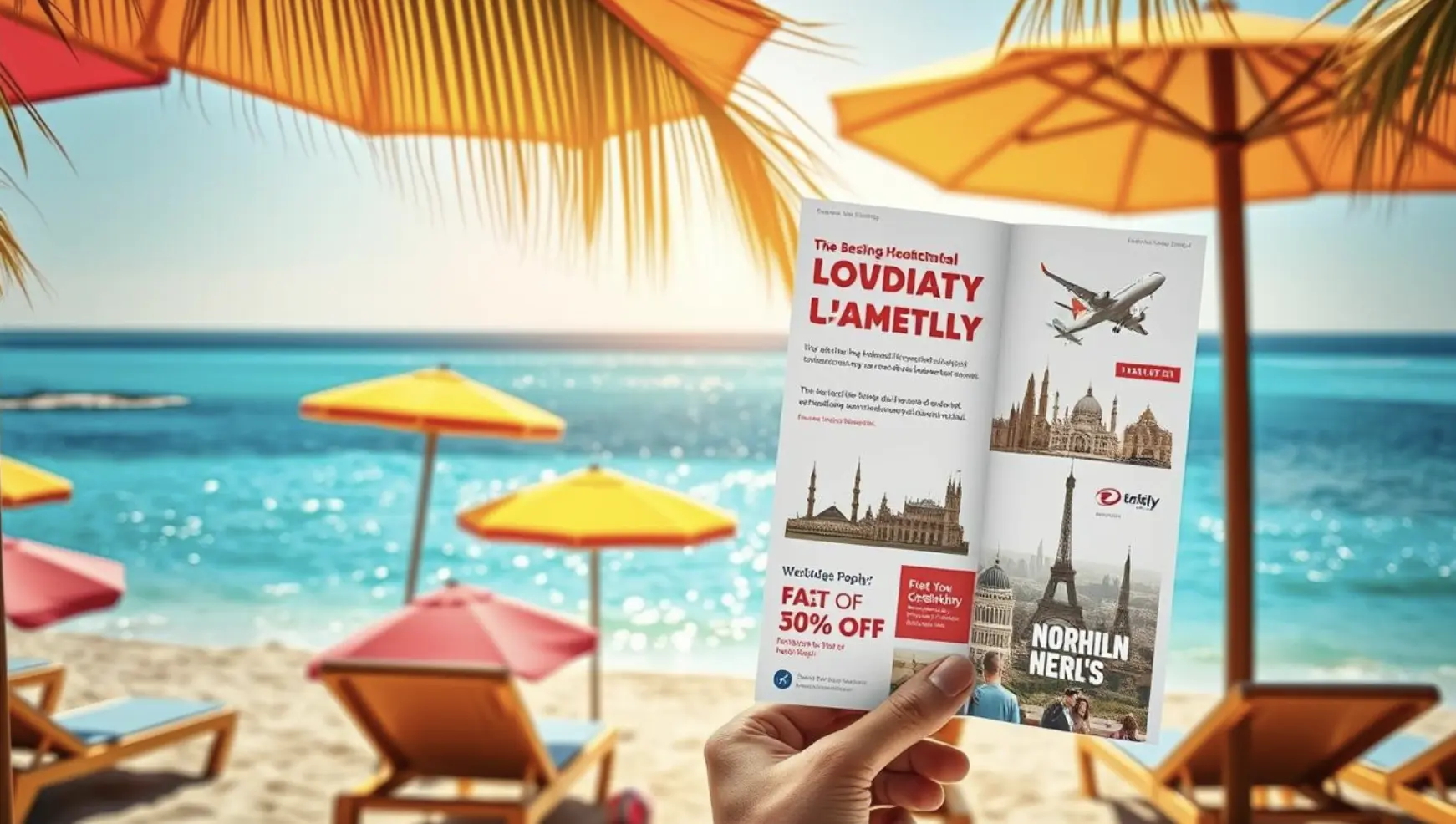Unlock the Secrets to Scoring the Best Travel Deals
Are you tired of breaking the bank every time you book a trip? Scoring great travel deals requires being savvy and informed. With so many options available, it’s easy to get overwhelmed and miss out on the best travel deals.
How to Find the Best Travel Deals
Whether you’re a seasoned traveler or just starting to explore, knowing where to look and when to book can make all the difference. By understanding the ins and outs of the travel industry, you can snag affordable flights, hotel stays, and vacation packages that fit your budget.
Key Takeaways
- Understand the best times to book flights and hotels for maximum savings.
- Learn how to use travel rewards and loyalty programs to your advantage.
- Discover the top resources for finding discounted travel options.
- Be aware of the hidden fees that can add up quickly.
- Explore alternative destinations for a more affordable getaway.
The Art of Travel Deal Hunting
Mastering the art of travel deal hunting requires a combination of strategy, patience, and industry insight. It’s about being informed and ready to act when opportunities arise.
Why Timing Is Everything in Travel Savings
Timing plays a crucial role in securing the best travel deals. Booking during off-peak seasons or taking advantage of last-minute offers can lead to significant travel savings. Understanding the fluctuations in demand and supply is key to capitalizing on these opportunities.
Understanding the Travel Industry Pricing Models
The travel industry employs complex pricing models that adjust rates based on demand, competition, and other factors. Dynamic pricing is a common strategy used by airlines and hotels, where prices fluctuate in real-time based on demand. Being aware of these models can help travelers make informed decisions and avoid overpaying.
The Psychology Behind Flash Sales and Limited-Time Offers
Flash sales and limited-time offers create a sense of urgency, prompting travelers to book quickly. This psychological trigger is designed to drive sales by making offers seem exclusive and time-sensitive. Travelers who understand this tactic can use it to their advantage by being prepared to act when such offers arise, thereby securing great deals on travel.
How to Find the Best Travel Deals: A Strategic Approach
To score the best travel deals, it’s essential to adopt a strategic approach that includes budgeting and thorough research.
Setting Your Travel Budget Realistically
Setting a realistic travel budget is the foundation of a successful trip. It’s crucial to consider all aspects of your travel expenses, including transportation, accommodation, food, and activities.
To create a realistic budget, start by identifying your priorities. Are you willing to splurge on luxury accommodations or save money on budget-friendly options? Consider using the 50/30/20 rule: 50% for necessities, 30% for discretionary spending, and 20% for saving or debt repayment.
Balancing Flexibility with Your Travel Needs
Being flexible with your travel plans can significantly impact your ability to find great deals. Consider traveling during the off-season or on less popular days.
A flexible traveler can take advantage of last-minute deals or special promotions. However, it’s also important to balance flexibility with your specific travel needs, such as specific destinations or activities.
The Importance of Research and Comparison
Travel research and comparison are critical components of finding the best travel deals. Utilize online resources, such as travel blogs, forums, and deal alert websites, to stay informed about the latest offers.
When comparing prices, consider using a table to organize your findings. Here’s an example:
| Travel Component | Option 1 | Option 2 | Option 3 |
| Flights | $400 | $350 | $320 |
| Accommodation | $200/night | $150/night | $100/night |
| Total Cost | $800 | $650 | $520 |
By comparing these options, you can make an informed decision that fits your travel budget.
Edit
Delete
Mastering Flight Deal Strategies
The quest for the perfect flight deal is a nuanced one, involving timing, comparison, and sometimes, a bit of creativity. To truly master the art of finding cheap flights, one must delve into various strategies that can significantly reduce travel expenses.
Best Days and Times to Book Flights
Understanding when to book flights can make a substantial difference in the cost. Research suggests that booking on certain days of the week or at specific times can lead to cheaper fares. For instance, Tuesdays and Wednesdays are often cited as the best days to book flights as airlines typically release their sales on Mondays, and prices tend to be lower mid-week before potentially rising again on weekends.
Using Fare Comparison Tools Effectively
Fare comparison tools are invaluable resources for travelers. Websites and apps like Google Flights, Skyscanner, and Kayak allow users to compare prices across different airlines, airports, and dates. To maximize their effectiveness, it’s essential to be flexible with travel dates and consider alternative airports.
Price Tracking and Alerts
One of the most effective ways to snag a great deal is by tracking prices and setting alerts. Many fare comparison tools offer the ability to track specific routes and notify users when prices drop. This proactive approach ensures that travelers can capitalize on sales or error fares.
Hidden City Ticketing and Other Hacks
Advanced travelers often employ strategies like hidden city ticketing, where a passenger books a flight with the intention of disembarking at a layover rather than the final destination. While this can result in significant savings, it’s crucial to understand the risks and potential consequences, such as the cancellation of return flights.
Budget Airlines: Pros, Cons, and Hidden Fees
Budget airlines offer an affordable way to travel, but it’s essential to weigh the pros and cons. While they can provide significant savings, additional fees for services like checked bags, food, and seat selection can quickly add up. Travelers must carefully consider these factors when choosing a budget airline.
International vs. Domestic Flight Booking Tactics
Booking strategies can vary significantly between international and domestic flights. For international flights, booking well in advance is often recommended, whereas domestic flights might offer better deals when booked at shorter notice. Understanding these nuances can help travelers make informed decisions.
Hotel Booking Secrets the Industry Doesn’t Share
Unlocking the best hotel deals requires knowledge of insider booking secrets. While many travelers are aware of the basics, there are several strategies that can significantly enhance their booking experience and save them money.
Direct Booking vs. Third-Party Sites
One of the primary decisions travelers face is whether to book directly with the hotel or use third-party booking sites. Direct booking often provides more flexibility and can result in better customer service. Hotels may offer loyalty points, room upgrades, or other perks to guests who book directly.
On the other hand, third-party sites can offer competitive pricing and the convenience of comparing multiple hotels at once. It’s essential to weigh these factors based on individual travel needs.
Leveraging Loyalty Programs and Status Matching
Loyalty programs can be incredibly rewarding for frequent travelers. By strategically leveraging loyalty programs, travelers can earn points or status that lead to free nights, upgrades, and other benefits.
Status matching is another valuable tool, allowing travelers to achieve a higher status in a loyalty program based on their status with a competing program.
hotel booking strategies
Last-Minute Hotel Booking Strategies
For travelers with flexible plans, last-minute booking can yield significant savings. Hotels often reduce rates for unsold rooms at the last minute.
Using last-minute booking apps or websites can help travelers capitalize on these deals.
Alternative Accommodations: Vacation Rentals, Hostels, and Home Exchanges
Beyond traditional hotels, alternative accommodations like vacation rentals, hostels, and home exchanges offer unique experiences and often better value.
Vacation rentals provide home comforts, while hostels offer social environments at budget-friendly prices. Home exchanges can be a cost-effective option for longer stays.
By understanding these hotel booking secrets, travelers can make more informed decisions and enjoy better value for their money.
All-Inclusive and Package Deals: When They’re Worth It
The allure of all-inclusive and package deals is undeniable, but are they always the best choice for travelers? These bundled offers can simplify the planning process and potentially save money, but it’s crucial to analyze their true value.
Analyzing the True Value of Bundled Offers
To determine if a package deal is worth it, compare the bundled price to the cost of booking each component separately. Consider what’s included and whether it aligns with your travel plans.
Negotiating Custom Travel Packages
For a more tailored experience, travelers can negotiate custom travel packages. This approach allows for flexibility in choosing services and accommodations that fit specific needs.
| Booking Type | Cost | Flexibility |
| Package Deals | Often discounted | Limited |
| Self-Booking | Variable | High |
| Custom Packages | Tailored | High |
Tour Operators vs. Self-Booking: Cost Comparison
Comparing costs between tour operators and self-booking can reveal significant differences. Tour operators may offer competitive pricing due to bulk bookings, but self-booking provides more control.
Reading the Fine Print on All-Inclusive Deals
It’s essential to carefully read the terms and conditions of all-inclusive deals to understand what’s covered and any potential additional fees.
Leveraging Technology for Travel Savings
Technology has revolutionized the way we travel, offering numerous tools to save money on flights, hotels, and more. By harnessing the power of travel apps, browser extensions, and automated deal alerts, travelers can significantly reduce their expenses.
Essential Apps for Deal Hunters
Several travel apps are designed to help users find the best deals. Apps like Hopper and Skyscanner allow users to compare prices across different airlines, hotels, and car rental services. These apps often provide price forecasts and alerts when prices drop, enabling travelers to make informed decisions.
- Hopper: Known for its price prediction feature.
- Skyscanner: Offers a comprehensive comparison of travel prices.
- Hotel Tonight: Specializes in last-minute hotel bookings at discounted rates.
Browser Extensions That Save You Money
Browser extensions can automatically apply discount codes and cashback offers at checkout. Extensions like CouponCabin and Honey are popular among savvy travelers. They work by scouring the web for available discounts and applying them seamlessly.
travel apps
Setting Up Automated Deal Alerts
Automated deal alerts are a great way to stay informed about sales and promotions without constantly monitoring prices. Services like Scott’s Cheap Flights and The Flight Deal offer email alerts for error fares and significant discounts on flights.
- Sign up for newsletters from travel deal websites.
- Configure deal alerts on travel apps.
- Follow travel deal aggregators on social media.
Using VPNs and Incognito Barnings for Better Prices
Some airlines and booking sites use cookies to track browsing history, potentially increasing prices if they see repeated searches for the same route. Using a VPN (Virtual Private Network) and incognito browsing mode can help avoid this price hike. This practice ensures that travelers see the same prices as everyone else, rather than inflated rates based on their browsing history.
By leveraging these technological tools, travelers can enjoy significant savings on their trips. Whether it’s through apps, browser extensions, or smart browsing practices, there’s a wealth of options available to reduce travel expenses.
Seasonal Travel: Finding Deals in Peak and Off-Peak Times
Understanding the nuances of seasonal travel can significantly impact your ability to snag the best deals. Traveling during the right season can offer a unique blend of experiences, from enjoying festivals and events to taking advantage of off-peak prices.
Shoulder Season Advantages
The shoulder season, which falls between peak and off-peak seasons, often provides the best balance between cost and experience. During this time, popular destinations are less crowded, and prices for accommodations and tourist attractions tend to be lower. For instance, visiting Europe in April or October can offer pleasant weather and smaller crowds compared to the peak summer months.
Destination-Specific Timing Strategies
Different destinations have optimal travel times based on their unique characteristics.
Beach Destinations
For beach destinations like Hawaii or the Caribbean, the off-season (usually late spring to early fall) can offer significant savings on accommodations and packages. However, this period might coincide with hurricane season, so it’s crucial to check weather forecasts.
Urban Getaways
Urban destinations like New York City or Tokyo are great year-round, but visiting during non-peak times (e.g., mid-January to mid-March) can result in lower hotel rates and fewer tourists.
Adventure Travel
For adventure travel, such as skiing or hiking, the best time is usually during the shoulder season when the weather is still favorable, and the crowds are smaller. For example, visiting ski resorts in early December or late March can provide excellent conditions without the peak season prices.
Holiday Travel Without the Holiday Prices
Traveling during holidays can be expensive due to high demand. However, being flexible with your travel dates and considering alternative destinations or accommodations can help mitigate these costs. For instance, visiting a destination a day before or after a major holiday can sometimes result in lower prices.
Last-Minute vs. Early Bird Booking: When Each Works Best
Both last-minute and early bird booking strategies have their advantages. Early booking can secure better rates for popular destinations and ensure availability. On the other hand, last-minute deals can offer significant discounts if you’re flexible with your travel plans and can take advantage of unsold inventory.
Travel Rewards Programs and Credit Card Strategies
Unlock the full potential of your travels by mastering travel rewards programs and credit card strategies. With the right approach, you can significantly reduce your travel expenses and enhance your overall travel experience.
Maximizing Points and Miles
To get the most out of your travel rewards, it’s crucial to understand how to maximize your points and miles. This involves choosing the right credit cards, using them effectively, and redeeming your points for maximum value.
For instance, using a credit card that offers bonus points for travel-related purchases can quickly accumulate a substantial number of points. Additionally, taking advantage of sign-up bonuses can provide a significant boost to your points balance.
Credit Card Sign-Up Bonuses Worth Pursuing
Credit card sign-up bonuses can be a lucrative way to earn a large number of points or miles quickly. However, it’s essential to choose cards with bonuses that align with your travel goals and spending habits.
Some of the most valuable sign-up bonuses come from premium travel credit cards, which often require a certain level of spending within a specified timeframe to qualify for the bonus.
Transferring Points for Maximum Value
The flexibility to transfer points to various airline and hotel loyalty programs can significantly enhance their value. Understanding the transfer ratios and the value of points in different programs is key to maximizing your rewards.
Airline Alliance Benefits for Budget Travelers
Airline alliances can offer substantial benefits for travelers, including access to a broader network of routes, shared lounges, and the ability to earn and redeem miles across multiple airlines.
For budget travelers, understanding the benefits and how to leverage them can lead to significant savings and enhanced travel experiences.
Hotel Loyalty Program Sweet Spots
Hotel loyalty programs can be a great way to earn rewards and enjoy benefits like free nights and upgrades. Identifying the sweet spots in these programs, such as elite status thresholds and bonus categories, can help maximize your rewards.
| Loyalty Program | Earning Structure | Redeption Options |
| Marriott Bonvoy | Earn 10 points per dollar spent | Free nights, upgrades, flights |
| Hilton Honors | Earn 10 points per dollar spent | Free nights, experiences, merchandise |
| World of Hyatt | Earn 5 points per dollar spent | Free nights, upgrades, spa treatments |
By strategically using travel rewards programs and credit card strategies, travelers can enjoy significant savings and enhanced experiences. Whether you’re a frequent flyer or an occasional traveler, understanding how to maximize your rewards can make a substantial difference.
Conclusion: Your Action Plan for Travel Deal Success
Scoring the best travel deals requires a combination of strategy, flexibility, and knowledge. By understanding the art of travel deal hunting, mastering flight and hotel booking strategies, and leveraging technology, you can significantly reduce your travel expenses.
To achieve travel deal success, it’s essential to have a clear action plan. Start by setting a realistic travel budget and being flexible with your travel dates. Use fare comparison tools and browser extensions to find the best deals, and consider alternative accommodations such as vacation rentals or hostels.
By implementing these strategies and staying informed about seasonal travel trends, you can create a personalized action plan that suits your travel needs. Whether you’re a seasoned traveler or just starting out, having a well-thought-out plan will help you make the most of your travel budget and enjoy a more affordable and enjoyable trip.
FAQ
What are the best days to book flights to get the cheapest deals?
According to various studies, booking flights on Tuesdays and Wednesdays can often result in cheaper fares, as airlines typically release their sales on Mondays.
How can I get the best value from all-inclusive package deals?
To get the best value, analyze the true cost of the package by comparing it to booking flights and hotels separately, and consider factors like the quality of accommodations and included activities.
Are budget airlines worth the savings?
Budget airlines can be a great option for short-haul flights or if you’re looking to save money, but be aware of additional fees for things like checked bags, food, and seat selection.
How can I maximize my travel rewards points and miles?
To maximize your rewards, focus on earning points and miles through credit card sign-up bonuses, use transfer partners to book travel, and take advantage of airline alliance benefits.
What’s the best way to find last-minute hotel deals?
To find last-minute hotel deals, use hotel booking apps like Hotel Tonight or Last Minute Travel, and consider alternative accommodations like vacation rentals or hostels.
Can using a VPN or incognito browsing really help me save money on travel?
Some evidence suggests that using a VPN or incognito browsing can help you avoid price increases based on your browsing history, but results may vary.
How do I know if a travel credit card is right for me?
Consider your travel habits, credit score, and financial situation when choosing a travel credit card, and look for cards with benefits that align with your needs.
What’s the shoulder season, and how can it help me save on travel?
The shoulder season refers to the period between peak and off-peak travel seasons, often offering better prices and smaller crowds, making it an ideal time to visit popular destinations.
Are there any strategies for avoiding peak holiday prices?
To avoid peak holiday prices, consider traveling during off-peak times, booking well in advance, or using travel rewards points to offset costs.
How can I stay informed about flash sales and limited-time travel offers?
Sign up for airline, hotel, and travel deal newsletters, follow travel companies on social media, and use deal alert tools to stay informed about flash sales and limited-time offers.







